- Home
- Mack Reynolds
The Second Mack Reynolds Megapack Page 4
The Second Mack Reynolds Megapack Read online
Page 4
* * * *
In 1800 he said, “You are to back, for twelve years, the adventurer Bonaparte. In 1812 drop him. You are to invest largely in the new nation, the United States. Send a representative to New York immediately. This is to be a century of revolution and change. Withdraw support from monarchy...” There was a gasp from around the table. “...and support the commercial classes. Back a certain Robert Clive in India. Withdraw all support of Spain in Latin America. In the American civil war to come, back the North.
“Largely, gentlemen, this is to be the century of England. Remember that.” He looked away for a moment, off into an unknown distance. “Next century will be different, but not even I know what lies beyond its middle.”
After he was gone, Amschel Mayer, representative from Vienna, murmured, “Colleagues, have you realized that at last one of The Contract relicts makes sense?”
Lord Windermere scowled at him, making small attempt to disguise his anti-Semitism. “What’d’ya mean by that, sir?”
The international banker opened the heavy box which contained the documents handed down since the day of Goldini. He emerged with a medium-sized gold coin.
“One of the original invested coins has been retained all these centuries, my lord.”
Windermere took it and read. “The United States of America. Why, confound it, man, this is ridiculous. Someone has been a-pranking. The coin couldn’t have existed in Goldini’s day; the colonies proclaimed their independence less than twenty-five years ago.”
Amschel Mayer murmured, “And the number at the bottom of the coin. I wonder if anyone has ever considered that it might be a date.”
Windermere stared at the coin again. “A date? Don’t be an ass! One does not date a coin more than a century ahead of time.”
Mayer rubbed his beardless face with a thoughtful hand. “More than six centuries ahead of time, my lord.”
* * * *
Over cigars and brandy they went into the question in detail. Young Warren Piedmont said, “You gentlemen have the advantage of me. Until two years ago I knew only vaguely of The Contract in spite of my prominence in the American branch of the hierarchy. And, unfortunately, I was not present when Mr. Smith appeared in 1900 as were the rest of you.”
“You didn’t miss a great deal,” Von Borman growled. “Our Mr. Smith, who has all of us tied so tightly with The Contract that everything we own, even to this cigar I hold in my hand, is his—our Mr. Smith is insignificant, all but threadbare.”
“Then there actually is such a person,” Piedmont said.
Albert Marat, the French representative, snorted expressively. “Amazingly enough, messieurs, his description, even to his clothes, is exactly that handed down from Goldini’s day.” He chuckled. “We have one advantage this time.”
Piedmont frowned. “Advantage?”
“Unbeknown to Mr. Smith, we took a photo of him when he appeared in 1900. It will be interesting to compare it with his next appearance.”
Warren Piedmont continued to frown his lack of understanding and Hideka Mitsuki explained. “You have not read the novels of the so clever Mr. H.G. Wells?”
“Never heard of him.”
Smith-Winston, of the British branch, said, “To sum it up, Piedmont, we have discussed the possibility that our Mr. Smith is a time traveler.”
“Time traveler! What in the world do you mean?”
“This is the year 1910. In the past century science has made strides beyond the conception of the most advanced scholars of 1810. What strides will be made in the next fifty years, we can only conjecture. That they will even embrace travel in time is mind-twisting for us, but not impossible.”
“Why fifty years? It will be a full century before—
No. This time Mr. Smith informed us that he is not to wait until the year 2000 for his visit. He is scheduled for July 16, 1960. At that time, friends, I am of the opinion that we shall find what our Mr. Smith has in mind to do with the greatest fortune the world has ever seen.”
Von Borman looked about him and growled, “Has it occurred to you that we eight men are the only persons in the world who even know The Contract exists?” He touched his chest. “In Germany, not even the Kaiser knows that I directly own—in the name of The Contract, of course—or control possibly two thirds of the corporate wealth of the Reich.”
Marat said, “And has it occurred to you that all our Monsieur Smith need do is demand his wealth and we are penniless?”
Smith-Winston chuckled bitterly. “If you are thinking in terms of attempting to do something about it, forget it. For half a millennium the best legal brains of the world have been strengthening The Contract. Wars have been fought over attempts to change it. Never openly, of course. Those who died did so of religion, national destiny, or national honor… But never has the attempt succeeded. The Contract goes on.”
Piedmont said, “To get back to this 1960 appearance. Why do you think Smith will reveal his purpose, if this fantastic belief of yours is correct, that he is a time traveler?”
“It all fits in, old man,” Smith-Winston told him. “Since Goldini’s time he has been turning up in clothing not too dissimilar to what we wear today. He speaks English— with an American accent. The coins he first gave Goldini were American double-eagles minted in this century. Sum it up. Our Mr. Smith desired to create an enormous fortune. He has done so and I believe that in 1960 we shall learn his purpose.”
He sighed and went back to his cigar. “I am afraid I shall not see it. Fifty years is a long time.”
They left the subject finally and went to another almost as close to their hearts. Von Borman growled, “I contend that if The Contract is to be served, Germany needs a greater place in the sun. I intend to construct a Berlin to Baghdad railroad and to milk the East of its treasures.”
Marat and Smith-Winston received his words coldly. “I assure you, monsieur,” Marat said, “we shall have to resist any such plans on your part. The Contract can best be served by maintaining the status quo; there is no room for German expansion. If you persist in this, it will mean war and you recall what Mr. Smith prophesied. In case of war, we are to withdraw support from Germany and, for some reason, Russia, and support the allies. We warn you, Borman.”
“This time Mr. Smith was wrong,” Borman growled. “As he said, oil is to be invested in above all, and how can Germany secure oil without access to the East? My plans will succeed and the cause of The Contract will thus be forwarded.”
The quiet Hideka Mitsuki murmured, “When Mr. Smith first invested his pieces of gold I wonder if he realized the day would come when the different branches of his fortune would plan and carry out international conflicts in the name of The Contract?”
* * * *
There were only six of them gathered around the circular table in the Empire State suite when he entered. None had been present at his last appearance and of them all only Warren Piedmont had ever met and conversed with anyone who had actually seen Mr. Smith. Now the octogenarian held up an aged photograph and compared it to the newcomer. “Yes,” he muttered, “they were right.”
Mr. Smith handed over an envelope heavy with paper. “Don’t you wish to check these?”
Piedmont looked about the table. Besides himself, there was John Smith-Winston, the second, from England; Rami Mardu, from India; Warner Voss-Richer, of West Germany; Mito Fisuki, of Japan; Juan Santos, representing Italy, France and Spain. Piedmont said, “We have here a photo taken of you in 1900, sir; it is hardly necessary to identify you further. I might add, however, that during the past ten years we have had various celebrated scientists at work on the question of whether or not time travel was possible.”
Mr. Smith said, “So I have realized. In short, you have spent my money in investigating me.”
There was little of apology in Piedmont’s voice. “We have faithfully, some of us for all our adult lives, protected The Contract. I will not deny that the pay is the highest in the world; however it is only a job. Par
t of the job consists of protecting The Contract and your interests from those who would fraudulently appropriate the fortune. We spend millions every year in conducting investigations.”
“You’re right, of course. But your investigations into the possibilities of time travel...?”
“Invariably the answer was that it was impossible. Only one physicist offered a glimmer of possibility.”
“Ah, and who was that?”
“A Professor Alan Shirey who does his research at one of the California universities. We were careful, of course, not to hire his services directly. When first approached he admitted he had never considered the problem but he became quite intrigued. However, he finally stated his opinion that the only solution would involve the expenditure of an amount of power so great that there was no such quantity available.”
“I see,” Mr. Smith said wryly. “And following this period for which you hired the professor, did he discontinue his investigations into time travel?”
Piedmont made a vague gesture. “How would I know?”
John Smith-Winston interrupted stiffly. “Sir, we have all drawn up complete accountings of your property. To say it is vast is an understatement beyond even an Englishman. We should like instructions on how you wish us to continue.”
Mr. Smith looked at him. “I wish to begin immediate steps to liquidate.”
“Liquidate!” six voices ejaculated.
“I want cash, gentlemen,” Smith said definitely. “As fast as it can be accomplished, I want my property converted into cash.”
Warner Voss-Richer said harshly, “Mr. Smith, there isn’t enough coinage in the world to buy your properties.
There is no need for there to be. I will be spending it as rapidly as you can convert my holdings into gold or its credit equivalent. The money will be put back into circulation over and over again.”
Piedmont was aghast. “But why?” He held his hands up in dismay. “Can’t you realize the repercussions of such a move? Mr. Smith, you must explain the purpose of all this…”
Mr. Smith said, “The purpose should be obvious. And the pseudonym of Mr. Smith is no longer necessary. You may call me Shirey—Professor Alan Shirey. You see, gentlemen, the question with which you presented me, whether or not time travel was possible, became consumingly interesting. I have finally solved, I believe, all the problems involved. I need now only a fantastic amount of power to activate my device. Given such an amount of power, somewhat more than is at present produced on the entire globe, I believe I shall be able to travel in time.”
“But, but why? All this, all this… Cartels, governments, wars...” Warren Piedmont’s aged voice wavered, faltered.
Mr. Smith—Professor Alan Shirey—looked at him strangely. “Why, so that I may travel back to early Venice where I shall be able to make the preliminary steps necessary for me to secure sufficient funds to purchase such an enormous amount of power output.”
“And six centuries of human history,” said Rami Mardu, Asiatic representative, so softly as hardly to be heard. “Its meaning is no more than this...?”
Professor Shirey looked at him impatiently.
“Do I understand you to contend, sir, that there have been other centuries of human history with more meaning?”
THE BUSINESS, AS USUAL
AUTHOR’S INTRODUCTION
This is one of those stories that you write in a couple of hours, send to the agent and forget about. However, to my surprise, the Magazine of Fantasy & Science Fiction picked it up in 1951 and, since then, I have sold it to anthologies and in translation at least once a year. If I had fifty stories that sold like this, I could retire. They even put it on television once in Belgium. How you could make a TV show of it I haven’t the vaguest idea, but there you are. I suspect that long after I have gone to my reward— which is moot—“The Business, As Usual” will still crop up.
—Mack Reynolds
* * * *
“Listen,” the time traveler said to the first pedestrian who came by, “I’m from the twentieth century. I’ve only got fifteen minutes and then I’ll go back. I guess it’s too much to expect you to understand me, eh?”
“Certainly I understand you.”
“Hey! You talk English fine. How come?”
“We call it Amer-English. I happen to be a student of dead languages.”
“Swell! But, listen, I only got a few minutes. Let’s get going.”
“Get going?”
“Yeah, yeah. Look, don’t you get it? I’m a time traveler. They picked me to send into the future. I’m important.”
“Ummm. But you must realize that we have time travelers turning up continuously these days.”
“Listen, that rocks me, but I just don’t have time to go into it, see? Let’s get to the point.”
“Very well. What have you got?”
“What d’ya mean, what’ve I got?”
The other sighed. “Don’t you think you should attempt to acquire some evidence that you have been in the future? I can warn you now, the paradoxes involved in time travel prevent you from taking back any knowledge which might alter the past. On your return, your mind will be blank in regard to what happened here.”
The time traveler blinked. “Oh?”
“Definitely. However, I shall be glad to make a trade with you.”
“Listen, I get the feeling I came into this conversation half a dozen sentences too late. What d’ya mean, a trade?
I am willing to barter something of your century for something of mine, although, frankly, there is little in your period that is of other than historical interest to us.” The pedestrian’s eyes held a gleam now. He cleared his throat. “However, I have here an atomic pocket-knife. I hesitate to even tell you of the advantages it has over the knives of your period.”
“Okay. I got only ten minutes left, but I can see you’re right. I’ve got to get something to prove I was here.”
“My knife would do it.” The pedestrian nodded.
“Yeah, yeah. Listen, I’m a little confused, like. They picked me for this job at the last minute—didn’t want to risk any of these professor guys, see? That’s the screwiest knife I ever saw, let me have it for my evidence.”
“Just a moment, friend. Why should I give you my knife? What can you offer in exchange?”
“But I’m from the twentieth century.”
“Ummm. And I’m from the thirtieth.”
The time traveler looked at him for a long moment. Finally, “Listen, pal, I don’t have a lot of time. Now, for instance, my watch.
“Ummm. And what else?”
“Well, my money here.”
“Of interest only to a numismatist.”
“Listen, I gotta have some evidence I been in the thirtieth century!”
“Of course. But business is business, as the proverb goes.”
“I wish the hell I had a gun.”
“I have no use for a gun in this age,” the other said primly.
“No, but I have,” the time traveler muttered. “Look, fella, my time is running out by the second. What d’ya want? You see what I got—clothes, my wallet, a little money, a key ring, a pair of shoes.”
“I’m willing to trade, but your possessions are of small value. Now, some art object—an original Al Capp or something.”
The time traveler was plaintive. “Do I look like I’d be carrying around art objects? Listen, I’ll give you everything I got but my pants for that screwy knife.”
“Oh, you want to keep your pants, eh? What’re you trying to do, Anglo me down? Or does your period antedate the term?”
“Anglo…what? I don’t get it.”
“Well, I’m quite an etymologist—”
“That’s too bad, but—”
“Not at all, a fascinating hobby,” the pedestrian said. “Now, as to the phrase ‘Anglo me down.’ The term ‘Anglo’ first came into popular use during the 1850-1950 period. It designated persons from the Eastern United States, English descent princi
pally, who came into New Mexico and Arizona shortly after that area was liberated—I believe that was the term used at the time—from Mexico. The Spanish and Indians came to know the Easterners as Anglos.”
The time traveler said desperately, “Listen, pal, we get further and further from—”
“Tracing back the derivation of the phrase takes us along two more side trails. It goes back to the fact that these Anglos became the wealthiest businessmen of the twentieth century. So much so that they soon dominated the world with their dollars.”
“Okay, okay. I know all about that. Personally I never had enough dollars to dominate anybody, but—”
“Very well, the point is that the Anglos became the financial wizards of the world, the most clever dealers, the sharpest bargainers, the most competent businessmen.”
The time traveler shot a quick despairing look at his watch. “Only three—”
“The third factor is one taken from still further in the past. At one time there was a minority, which many of the Anglos held in disregard, called the Joos. For many years the term had been used, ‘to Joo you down’—meaning to make the price lower. As the Anglos assumed their monetary dominance, the term evolved from ‘Joo you down’ to ‘Anglo you down’; and thus it has come down to our own day, although neither Anglo nor Joo still exists as a separate people.”
The time traveler stared at him. “And I won’t be able to take the memory of this story back with me, eh? And me a guy named Levy.” He darted another look at his watch and groaned. “Quick!” he said. “Let’s make this trade; everything I got for that atomic knife!”
The deal was consummated. The citizen of the thirtieth century stood back, his loot in his arms, and watched as the citizen of the twentieth, nude but with the knife grasped tightly and happily in hand, faded slowly from view.
The knife poised momentarily in empty air, then dropped to the ground as the time traveler completely disappeared.
The other stooped, retrieved it, and stuck it back in his pocket. “Even more naive than usual,” he muttered. “Must have been one of the very first. I suppose they’ll never reconcile themselves to the paradoxes. Obviously, you can carry things forward in time, since that’s the natural flow of the dimension; but you just can’t carry anything, not even memory, backward against the current.”

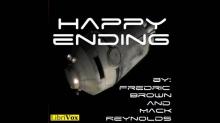 Happy Ending
Happy Ending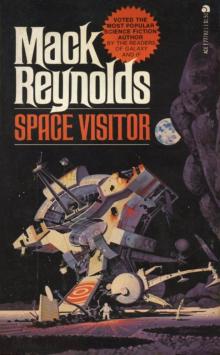 Space Visitor
Space Visitor A Kiss Before Loving
A Kiss Before Loving Episode on the Riviera
Episode on the Riviera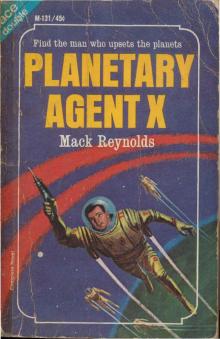 Planetary Agent X
Planetary Agent X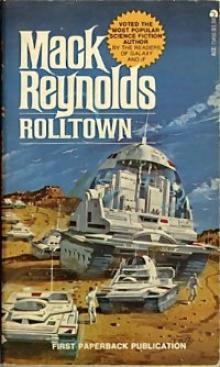 Rolltown bh-3
Rolltown bh-3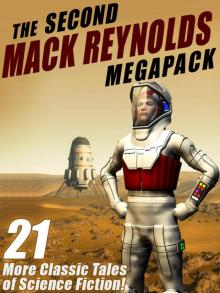 The Second Mack Reynolds Megapack
The Second Mack Reynolds Megapack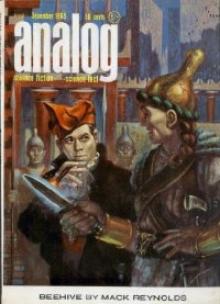 Dawnman Planet up-2
Dawnman Planet up-2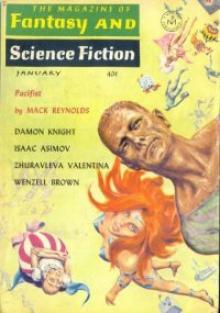 Pacifist
Pacifist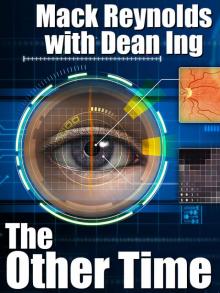 The Other Time
The Other Time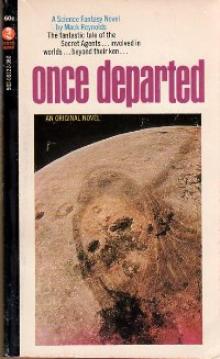 Once Departed
Once Departed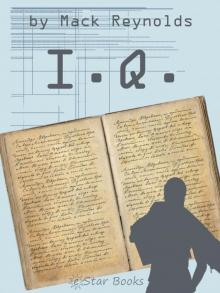 IQ
IQ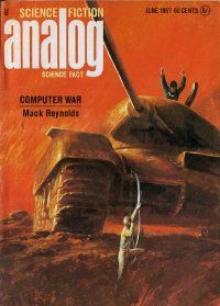 Computer War
Computer War Earth Unaware
Earth Unaware The Rival Rigelians up-3
The Rival Rigelians up-3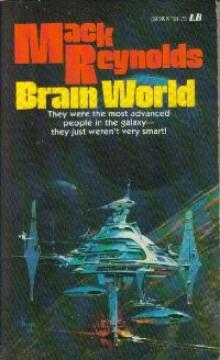 Brain World up-7
Brain World up-7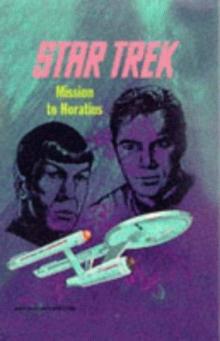 Star Trek - TOS - Mission to Horatius
Star Trek - TOS - Mission to Horatius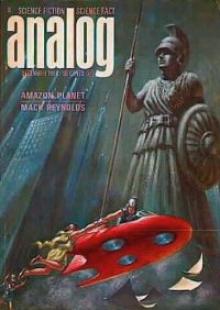 Amazon Planet up-5
Amazon Planet up-5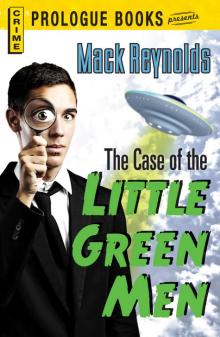 The Case of the Little Green Men
The Case of the Little Green Men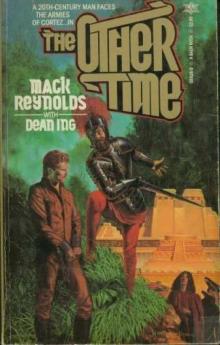 Other Time
Other Time The Mack Reynolds Megapack
The Mack Reynolds Megapack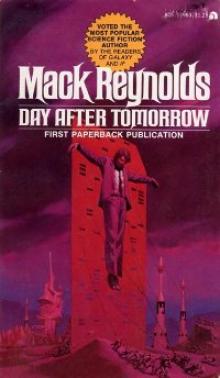 Day After Tomorrow
Day After Tomorrow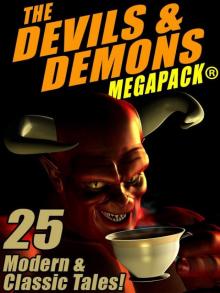 The Devils & Demons MEGAPACK ®: 25 Modern and Classic Tales
The Devils & Demons MEGAPACK ®: 25 Modern and Classic Tales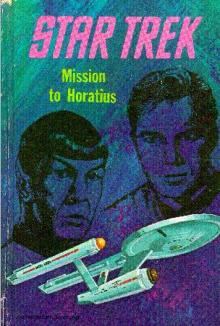 Mission to Horatius
Mission to Horatius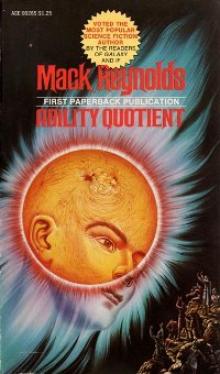 Ability Quotient
Ability Quotient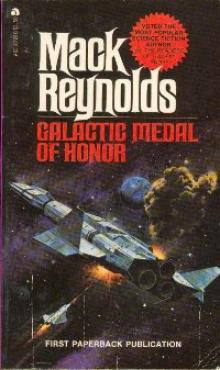 Galactic Medal of Honor
Galactic Medal of Honor Trojan Orbit
Trojan Orbit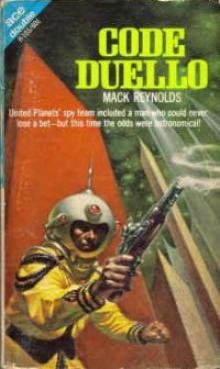 Code Duello up-4
Code Duello up-4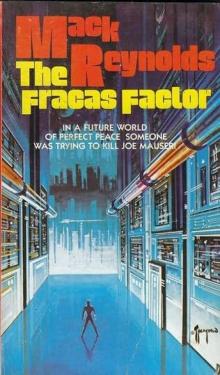 The Fracas Factor
The Fracas Factor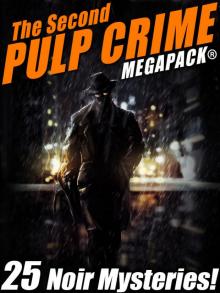 The Second Pulp Crime
The Second Pulp Crime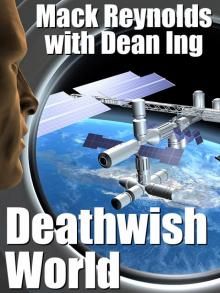 Deathwish World
Deathwish World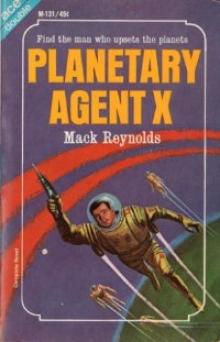 Planetary Agent X up-1
Planetary Agent X up-1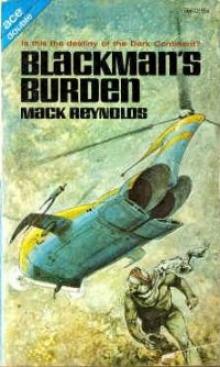 Blackman' Burden na-1
Blackman' Burden na-1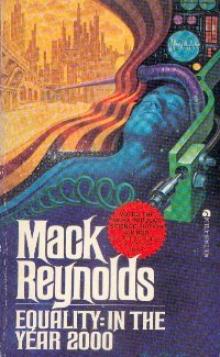 Equality: In the Year 2000 jw-2
Equality: In the Year 2000 jw-2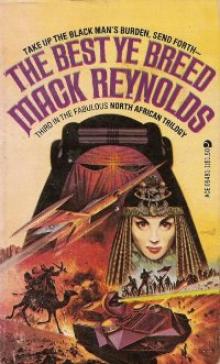 The Best Ye Breed na-3
The Best Ye Breed na-3 The Jet Set
The Jet Set The Rival Rigelians
The Rival Rigelians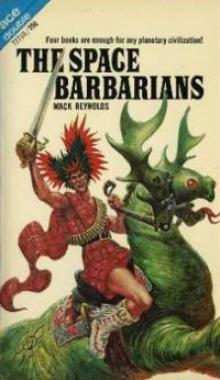 The Space Barbarians
The Space Barbarians